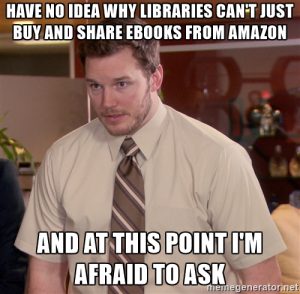 (N.B. Even though I am currently adventuring in LibraryLand, I am definitely not a librarian. If there was any doubt, this post will make that clear. If you are a librarian, I assume you get why ebooks don’t get the first sale doctrine applied already. This is mostly for more own edification and maybe for some who aren’t librarians.)
(N.B. Even though I am currently adventuring in LibraryLand, I am definitely not a librarian. If there was any doubt, this post will make that clear. If you are a librarian, I assume you get why ebooks don’t get the first sale doctrine applied already. This is mostly for more own edification and maybe for some who aren’t librarians.)
Have you ever wondered – why are libraries actually allowed to lend books? It may sound like a dumb question, but I bet most (non-librarian) people have never really thought about it. The reasons your public library is legally allowed to lend out physical books is because of principles in law called the “First Sale Doctrine” (or more properly in Canada, the “exhaustion doctrine” or the doctrine of the “exhaustion of intellectual property rights.”) This is the notion that once a a physical product is sold, the intellectual property rights of the seller can no longer be exercised on the subsequent buyer, meaning they are allowed to lend or resell it without seeking additional permission or offering additional compensation. This right, which permits libraries once they have purchased the initial copy of a book to then lend it out, is the same one that permits used book stores to operate.
So far so good. Libraries have operated in North America for a hundred years and more under this doctrine. So what’s the problem?
Well, turns out the doctrine is (currently) only understood to apply to physical objects (i.e. books), in part because their physical nature means they are both rivalrous goods and a potentially exhaustible one (it wears out over time – I think the current heuristic in libraries is a book survives roughly 25 checkouts after which it likely needs replacing by a new copy.) Both of which mean that while publishers might prefer every reader had to buy a new copy of a book, they can mostly live with libraries being able to lend out copies, as they need to buy more of popular ones or ones that wear out and they’ve come to see the benefits too of libraries popularizing titles.

original image from zoomzum.com
But increasingly people want to ready digitally, and with books that means eBooks. However, unlike their physical counterparts, eBooks are (potentially) neither rivalrous nor exhaustible – each “copy” of a file is identical yet both a separate physical and digital entity, and in theory can be used infinitely without degradation to the original. This (obviously) offers up some challenges to the notion of “exhaustion” and the rights associated with it.
This is the reason libraries can’t simply grab a copy of an ebook from wherever and start lending it. Instead, they have had to enter into all sorts of painful relationships with publishers, from adding DRM to limit the number of reuses and preventing further copies being made, to paying exorbitant prices for their ‘lending’ copies, as a way to try to reinsert rivalrousness and exhaustibility into the digital. The struggle to figure out what’s fair and workable has been going on for a least a decade now. You may have seen the Fair Ebook Pricing For Libraries campaign that started last year, just another volley in the protracted effort to find a more fair deal. Because make no mistake, right now the balance is tipped far in the favour of publishers. If you’ve ever wondered about the (relative) limited availability of eBook titles at your library or the arcane lending rules imposed on your use, now you know why.
At that’s it. Sorry, I wish I had some more profound conclusion here or some easy solution to this problem. But no, this post was just me finally catching up on why we even have the problem in the first place. #slowlearner – SWL
